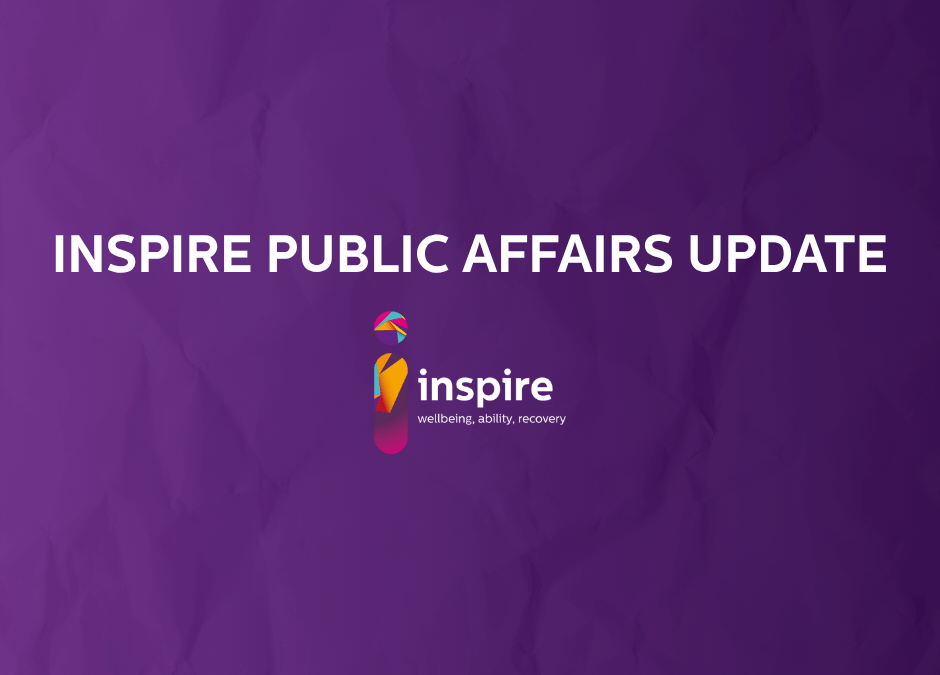Week Commencing - 10/11/2025
Inspire’s public affairs update is your source for the latest Northern Ireland Assembly discussions relevant to mental health, addiction, intellectual disability and autism.
Our aim is to inform the public, our colleagues and the people who use Inspire services about pertinent issues in the political space, issues that should always be informed by the voice of lived experience.

On 6th November, the Mental Health Champion for Northern Ireland, Professor Siobhán O’Neill, briefed the Committee for Health.
- Professor O’Neill spoke about a number of mental health-related issues in Northern Ireland, including the current state of the Mental Health Strategy. “The reality is that the Mental Health Strategy is not going to be fully implemented,” she said.
- She stated that the current spend on mental health services in Northern Ireland, per head of population, was £212, which lags behind the equivalent figure in England (£264) quite significantly.
- With respect to the voluntary and community sector’s increased role in mental health services, as per the Strategy, she said: “The funding gaps are… significant and the integration of the community and voluntary sector accounts for the largest gap so far of £12.3 million.” She went on to reference cuts in funding to a sector otherwise expected to provide services and low morale amongst the workforce. “They are being asked to do more with less.”
- Describing the situation on the ground as being “very bleak indeed”, Professor O’Neill pointed out that there is critical overcapacity in the mental health in-patient settings, a situation that is leading 75% of psychiatrists to report delays in admission. Psychiatrists, she said, are calling for greater provision of alternative care options, including community-based treatments, supports and housing.
- She stated that multidisciplinary teams in GP surgeries are doing important work; however, they are referring patients into an already overstretched system.
- According to research commissioned by the Mental Health Champion’s office, and conducted by the London School of Economics, found that Northern Ireland’s mental health crisis is incurring direct costs of £45 million every year.
- Investing in community services would return £1.39 in savings for every £1 spent, she said. She went on to suggest that a new approach to brief interventions for brief could £5 millions annually.
- On the topic of suicide intervention, she cited the need for new types of prevention interventions: “We need to be helping people in crisis in a different way.” In addition, she reminded the committee that not every individual experiencing suicidal distress requires treatment for mental illness.
- She stressed that poverty, homelessness and trauma are key drivers of the current rates of mental ill health and suicide, along with a requirement to involved the Department of Education and the Department of Justice in a cross-cutting response.
- She said that data demonstrates a high absence of hope amongst young people: “We urgently need health and education to work together.”
- In response to a question from the Committee’s vice-chair, Danny Donnelly MLA, Professor O’Neill said that people living with an eating disorder are treated differently depending on the health and social care trust area in which they live. She described eating disorders as one of the “deadliest of all of the mental illnesses. It has a very high death rate.”
- Colin McGrath MLA talked about the “saddest” part of the current situation being the scaling back of ambition relating to mental health services. “The bottom line is that we’re failing people because we’re not actually delivering on the strategy,” he said. He asked Professor O’Neill to identify the “bare minimum” deliverables under the Department of Health’s new plan. In her answer, she highlighted importance of properly designed crisis services.
- Órlaithí Flynn MLA sought clarification about Professor O’Neill’s conversations with the Minister of Health about mental health funding. Professor O’Neill said that she has spoken with the Minister but, unfortunately, his department does not have the money it needs to advance the Strategy in its original form.
- Diane Dodds MLA raised a query around Professor O’Neill’s discussions with the Department of Health prior to the “fairly drastic” decision to move on from 80% of the original Mental Health Strategy. Professor O’Neill confirmed that she – along with various other stakeholders – had been interviewed by officials in advance of the deliverability review’s finalisation but said “It’s actually more than 80%, we’ve only funded 1% of the whole funding. It’s actually, probably, much worse than that.”
“It’s actually more than 80%. We’ve only funded 1% of the whole Strategy.
It’s probably much worse than that.”

On 4th November, following a lengthy debate, MLAs vote to approved the following motion:
That this Assembly recognises that the transferable skills developed by many armed forces service leavers and veterans can make an important contribution to our economy and build stronger communities; believes that those serving, service leavers, veterans and their families should not face disadvantage as a result of their military service when accessing services, including healthcare, education and housing; welcomes, in that context, the legal duty placed on a range of public bodies in Northern Ireland to have due regard to the principles of the armed forces covenant; calls on the Executive to ensure that Departments meet that duty, including by appointing a departmental armed forces liaison officer; and further calls for closer collaboration between government, employers, education providers and veterans’ organisations, which is essential to support the successful transition to civilian life, and in the interests of a shared and inclusive society.
Oral Ministerial Question on Transmission Framework for Young People with Autism
- On 3rd November, Paula Bradshaw MLA asked the Minister of Health, Mike Nesbitt, to outline any plans his department has to develop and fund a transition framework that supports young people with autism.
- The Minister referenced the new learning disability service model, which is currently out for consultation.
- He said that it sets out a framework to support people transitioning into day services, carers support, independent living, healthcare and specialist mental health services. In addition, a transitions protocol has been developed to standardise the planning process across the trusts.
- He added that the draft children’s emotional health and wellbeing framework identifies transitions as a key area of focus: “I want to ensure that young people with a range of neurodevelopmental needs, including autism, are supported and prepared as they navigate the shift from child to adulthood.”
FACT OF THE WEEK
“Over 50% of our pensioners and over 60% of our people with disabilities live in fuel poverty.”
Kellie Armstrong MLA, 03.11.25

Week commencing 10th November 2025
Assembly motion: Establishing an Independent Environmental Protection Agency – 10th November
All-Party Group on Autism – 11th November
All-Party Group on Climate Action – 12th November
Committee for Health: Briefing from Independent Autism Reviewer – 13th November
Commitee for Communities: NICVA and departmental briefings on Partnership Agreement between Government and the Voluntary and community sector – 13th November
Written by:

Kyle Duncan
Engagement and Public Affairs Manager

Matthew Coyle
Policy and Campaigns Officer
